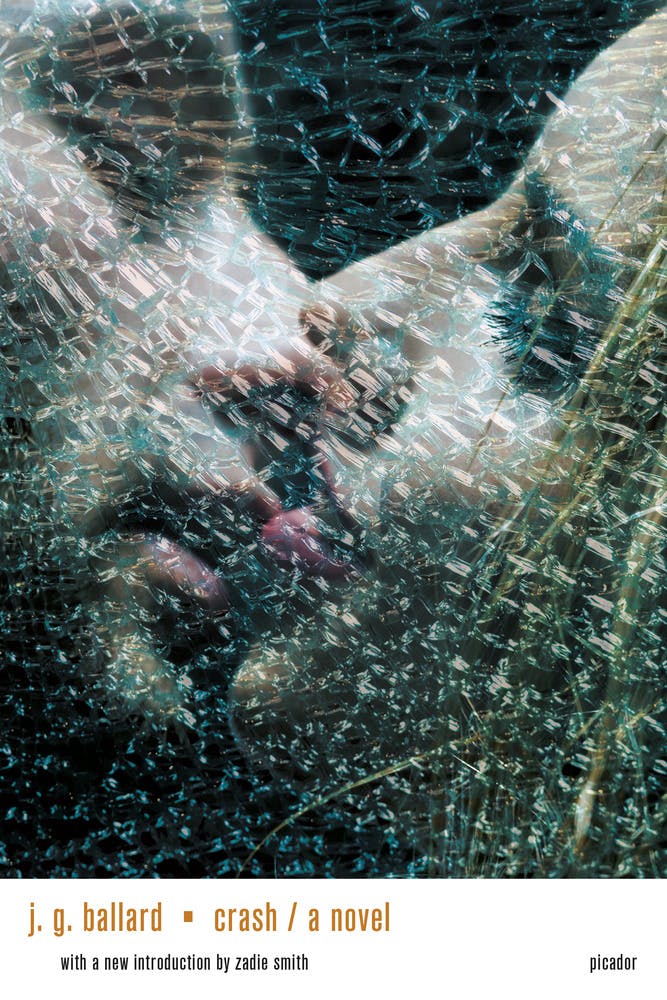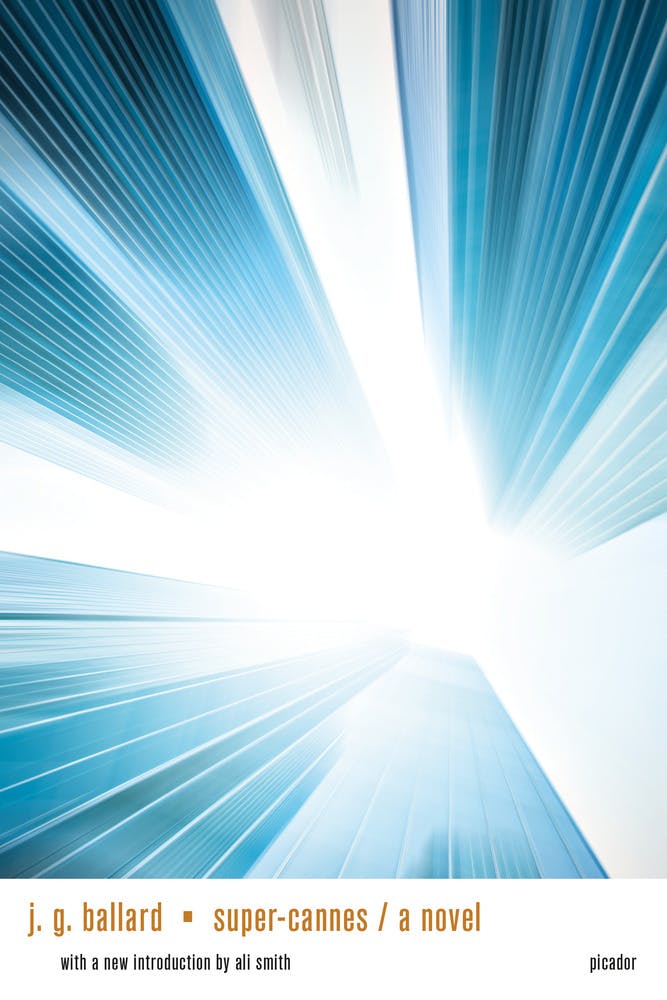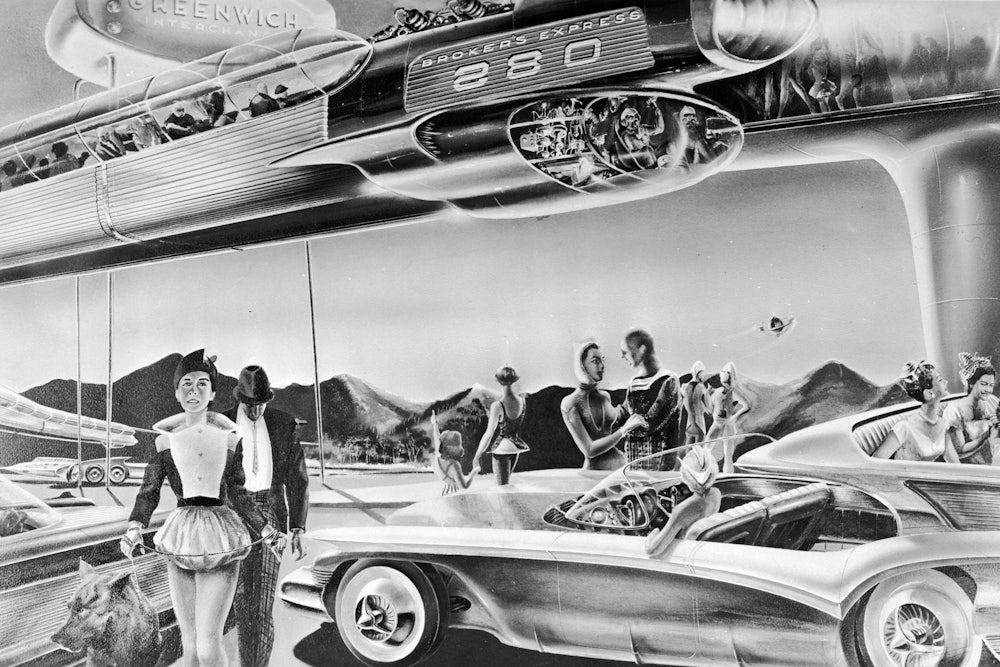One of the great secrets of modern life is that we don’t actually want what we want. Instead, we want to go on wanting, luxuriating in our deprivation. The British novelist J.G. Ballard, a lifelong foe of gratified desire, predicted our predicament with eerie prescience. In two essential novels reissued by Picador, the exquisitely grotesque Crash (1973) and the eerily civilized Super-Cannes (2000), Ballard warns against the lures of easy satisfaction.
Reviewers have often called Ballard’s dystopian visions “prophetic”: He foresaw self-driving cars, Uber-style ridesharing, and the lavish corporate campuses where life and labor blur into one another. But perhaps his canniest forecast was that comfort would prove so lethally uncomfortable. “Suburbs,” he reflected in an interview in the Paris Review,
are far more sinister places than most city dwellers imagine. Their very blandness forces the imagination into new areas. I mean, one’s got to get up in the morning thinking of a deviant act, merely to make certain of one’s freedom. It needn’t be much; kicking the dog will do.

Super-Cannes is set in such a suburb: Eden-Olympia is a corporate park on the outskirts of Cannes in “Europe’s silicon valley.” In the techno-utopian patois of Wilder Penrose, the community’s resident psychiatrist, the park is an “ideas laboratory for the new millennium,” an office-cum-resort outfitted with athletic facilities, stores where residents who see shopping as a “folkloric ritual” can browse in person, and a cushy hospital that treated Jacques Chirac when he “sprained his thumb opening an oyster at Colombe D’Or.” The high-power executives who live there never have—or want—to leave.
Penrose anticipates the likes of Google’s nap pods when he explains Eden-Olympia’s strategy to its newest residents, a British pediatrician named Jane and her hapless husband Paul. The way to maximize productivity, Penrose tells the pair, is to “make the office feel like a home—if anything the real home.” Labor permeates leisure: the lavish workplaces of Eden-Olympia have “service stations, where people sleep and ablute.”
But the crystalline pools gleaming behind each mansion are filled with “unsettled water,” and “a dream of violence” hovers over their “manicured lawns.” Jane and Paul are dismayed to find they’ve been allotted the house that belonged to David Greenwood—a seemingly well-adjusted doctor who founded an orphanage for troubled youth before he went on an unexplained killing spree, shooting several of his co-workers and, ultimately, himself. The house he left behind is haunted by reminders of his mysterious life. Bullets glint at the bottom of the pool, and Paul discovers a library of Alice in Wonderland books that Greenwood lent out to his charges at the orphanage.
At the hospital, Jane prescribes herself opiates and settles into a fog of overwork. She hopes to exert the same cold control over her neighbors’ bodies that the park’s planners exerted over its glassy towers and exact flower beds: She’s piloting a data-collection initiative requiring residents to log all of their anatomical information each morning. The goal of the project is to preventatively eliminate disease altogether, to exile even minor health defects from corporate paradise. There’s a touch of eugenicist fervor about her enthusiasm, though Penrose assures Paul with ominous eagerness that “there’s nothing racist, by the way. We’re truly multinational—Americans, French, Japanese. Even Russia and East Europeans.”
When Jane leaves for work each day, Paul, an amateur pilot convalescing after a minor accident, indulges his obsession with the dead doctor, combing through Greenwood’s old patient lists and retracing the route of the murders. One evening, he leans back into his deck chair, looks out over the picturesque valley, and poses the central Ballardian question: “it’s blissful here. Absolutely perfect. So what went wrong?” The answer, it seems, is that there are too few pampered poodles to kick.
Ballard is a master of the almost imperceptibly slow descent into chaos, and his fiction reveals how apparent calm tends to mask actual mayhem. For him and his characters, catastrophe is often a more candid manifestation of hostilities that were already simmering just beneath the surface. In his iconic 1975 thriller High-Rise, a luxury apartment complex degenerates when its residents take up arms against each other, prompted by nothing but disputes over clogged garbage chutes. Even before the first eruptions of overt rage, we detect a “hard mantle of personal rivalry” lurking below “the froth of professional gossip.” Bloodshed in Ballard is a question of architecture, not agency, and the true perpetrator in High-Rise is the building itself. While “the elevators pumping up and down the long shafts resembled pistons in the chamber of a heart,” the people “moving along the corridors were the cells in a network of arteries.”
The high-rise—“a model of all that technology had done to make possible the expression of a truly ‘free’ psychopathology”—anticipates the sinister suburbs of Super-Cannes. In Eden-Olympia, as in the high-rise, opulence yields glazed boredom. Under the pretense of making a cocktail of painkillers to dull Paul’s aching joints, Jane doses her husband with a sedative—an almost too-obvious metaphor for the seductive excesses of their patrician lifestyle. But despite her best efforts to medicate him into tranquility, Paul begins to uncover the systemic evil that underpins his ostensibly idyllic home.
He begins to notice “ratissages,” planned attacks on local immigrant populations. “The crimes are somehow…recreational,” he tells Penrose, aghast. But Penrose, the mastermind behind the assaults, is not in the least surprised, and he reveals to Paul that he’s been prescribing violence as therapy: Over-perfection is its own kind of malady, and the remedy is scheduled bouts of imperfection, gashes of ugliness as carefully calculated as everything else in the luxury park.

Paul purports to oppose Penrose’s nefarious experiments, but he still seeks excuses to participate. He tells himself he’s only accompanying his neighbors on their raiding parties to gather incriminating evidence, but he cannot bring himself to go to the police. At the end of Super-Cannes, he sets off on a murder campaign that mirrors David Greenwood’s. Like his forerunner, he plans to resist violence by perpetuating it. “Despite myself, I still admired Penrose, and the core truth of his bold but deranged vision,” he confesses. His final act of resistance may be no more than the fulfillment of his own perverse fantasy.
For his part, Penrose defends his therapy program even when it begins to reel out of control, culminating in murderous rampages. “We realize how suffocatingly humane we’ve become, dedicated to moderation and the middle way,” he explains. “The suburbanization of the soul has overrun our planet like the plague.” The residents of Eden-Olympia are trapped between two inhumanities: the placidity of their non-home and the dizzying temptations of cruelty.
Ratissages are advanced entertainments for the most insuperable malaises, and the gang of executives that carries them out films their handiwork and watches the footage later—an homage to nearby Cannes, where Paul attends a party in honor of the famous film festival. But pain loses its sting for the onlookers and Paul alike when it becomes mere entertainment, and even as his attacks escalate, Penrose already craves more destructive distractions.
Like the glutted inhabitants of Eden-Olympia, the characters in Crash turn to violence in an effort to relieve their despondency. Monumentally weird, aggressively perverse, and not infrequently nauseating, Ballard’s most infamous novel is a raw tapestry of mucous membranes and mucilage, gristle and gore and globules of semen. Its hero, Dr. Robert Vaughan is a demented “TV scientist” who hosts a program about traffic and dreams of dying in a collision with Elizabeth Taylor. A dedicated voyeur, he follows his illicit police radio to the site of accidents that he photographs from the distance in a frenzy of arousal. But he yearns for more direct participation, and his skin is mottled with scars from his many deliberate accidents. In the hospital, he encounters the book’s narrator, James Ballard, who is recovering from a car crash that has altered and revitalized his sexuality. The men drive together for hours, conducting a tacit courtship along the way.
Crash is a perversely poetic book. Vaughan lists injuries almost litanically, obsessing over “mechanisms of passenger ejection, the geometry of kneecap and hip-joint injuries, deformation of passenger compartments in head-on and rear-end collisions, injuries sustained in accidents at roundabouts, at trunk-road intersections, at the junctions between access roads and motorway intersections, the telescoping mechanisms or car-bodies in front-end collisions,” and on and on. Ballard echoes Vaughan, depicting wounds with loving delicacy. A middle-aged cashier crushed in her car has “fragments of the tinted windshield set in her forehead like jewels,” and when Elizabeth Taylor is made up to play the part of a crash victim in a commercial, “the elaborate lacework of blood” falls from her forehead “like a red mantilla.”
Crash is like a highway with recurrent scenery, any stretch of which seems to be everywhere and nowhere at once. It recycles images and vocabulary, favoring words like “stylized” and “metallized,” highlighting the repetitiveness of a sex act that comprises a series of predictable permutations. For the cast of Crash, the human body is repertoire of familiar boredoms. Coitus is as coolly mechanical as anguished abrasions are intimate, and Ballard describes normal sex with medical detachment: The narrator strokes one lover’s “perineum” while her hand presses against his “right testicle.” When his wife, Catherine, gets out of bed in the mornings, she seems like “some efficient mechanic servicing herself.”
In “Project for a Glossary of the Twentieth Century,” a short piece printed in Zone in 1992, Ballard defines “science fiction” as “the body’s dream of becoming a machine.” In Crash, this dream comes true as humans converge with their cars, thereby crafting new sexualities for themselves. Vaughan’s skin has “an unhealthy and metallic sheen, like the worn vinyl of the car interior,” and the narrator savors the crippled limbs of the car crash victims he sleeps with. His couplings are an “exploratory ordeal,” a reinvention of anatomy that multiplies orifices. At one point, he ejaculates into a cut on his partner’s thigh.
His final meeting with Vaughan is beautiful and ethereal. The lovers take acid and watch with awe as a bus “irradiating” the highway bears down on them “like an alighting arch-angel.” The traffic becomes a weightless tracery of light while they consummate their affair as chastely as possible, almost bodilessly. Vaughan’s inevitable death, the fruit of a crash he orchestrates with Elizabeth Taylor, is a manic artist’s masterpiece. “For me, Crash is a novel with a happy ending,” Ballard said later. Its many mutilations are images more than events. Even its grossest perversities are disappointingly harmless, scratches on the surface that barely leave a bruise.
The problem with violence aestheticized, violence hollowed out into image, is that the stakes are so low. Crash is a record of collision without repercussion. Representations glance off each other, and even death proves decorative. Real intimacy demands deeper incision. The crime wave in Eden-Olympia is an effort at communication in a community where estrangement is practically a design feature:
At Eden-Olympia there were no parking problems, no fears of burglars or purse-snatchers, no rapes or muggings. The top-drawer professionals no longer needed to devote a moment’s notice to each other, and had dispensed with the checks and balances of community life.
Without clash, there’s no occasion for contact. Crash and Super-Cannes present a dilemma. Acts of brutality can sate our appetites for excitement only when they have real ramifications—when they devastate. Accidents without injury merely reiterate our boredom. But when we subjugate other people, we’re implicated us in real wrongdoing.
Happily, the solution is simple, and it’s already underway. One of Ballard’s favorite authors was Kafka, by his lights “the most important writer of the twentieth century.” In a short piece in the Sunday Times in 1993, he writes that Kafka
describes the fate of the isolated man who is surrounded by a vast and impenetrable bureaucracy, and begins to accept himself on the terms of the bureaucracy imposes. Human beings today are in a very similar position. We are surrounded by huge institutions we can never penetrate: the City, the banking system, political and advertising conglomerates, vast entertainment empires. They’ve made themselves user-friendly, but they define the tastes to which we conform. They’re rather subtle, subservient tyrannies, but no less sinister for that.
If this worries you, just recall how delectable Ballard’s characters find it to recover, for a moment, a sense of real powerlessness. As Penrose notes, “people no longer need enemies—in this millennium their great dream is to become victims.” When technology finally dominates us, when high-rises turn against us and cars crash themselves, we will relish our subordination. Until then there’s Ballard’s fiction, catering to our grossest fantasies, chauffeuring us further and faster than we would dare to drive ourselves.
